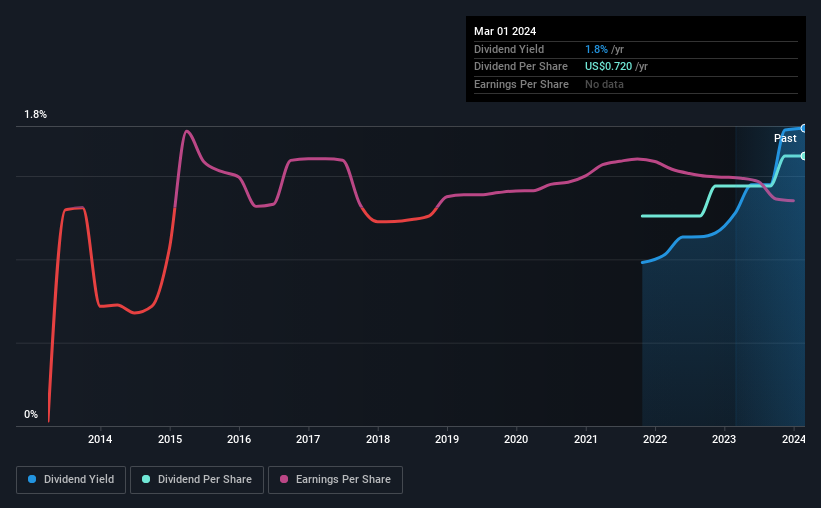It Might Not Be A Great Idea To Buy Village Bank and Trust Financial Corp. (NASDAQ:VBFC) For Its Next Dividend
Village Bank and Trust Financial Corp. (NASDAQ:VBFC) stock is about to trade ex-dividend in four days. The ex-dividend date is one business day before a company's record date, which is the date on which the company determines which shareholders are entitled to receive a dividend. It is important to be aware of the ex-dividend date because any trade on the stock needs to have been settled on or before the record date. Therefore, if you purchase Village Bank and Trust Financial's shares on or after the 7th of March, you won't be eligible to receive the dividend, when it is paid on the 15th of March.
The company's next dividend payment will be US$0.18 per share, and in the last 12 months, the company paid a total of US$0.72 per share. Based on the last year's worth of payments, Village Bank and Trust Financial stock has a trailing yield of around 1.8% on the current share price of US$40.30. We love seeing companies pay a dividend, but it's also important to be sure that laying the golden eggs isn't going to kill our golden goose! So we need to check whether the dividend payments are covered, and if earnings are growing.
View our latest analysis for Village Bank and Trust Financial
Dividends are usually paid out of company profits, so if a company pays out more than it earned then its dividend is usually at greater risk of being cut. Village Bank and Trust Financial is paying out an acceptable 51% of its profit, a common payout level among most companies.
When a company paid out less in dividends than it earned in profit, this generally suggests its dividend is affordable. The lower the % of its profit that it pays out, the greater the margin of safety for the dividend if the business enters a downturn.
Have Earnings And Dividends Been Growing?
Companies with falling earnings are riskier for dividend shareholders. If earnings decline and the company is forced to cut its dividend, investors could watch the value of their investment go up in smoke. With that in mind, we're discomforted by Village Bank and Trust Financial's 8.7% per annum decline in earnings in the past five years. Ultimately, when earnings per share decline, the size of the pie from which dividends can be paid, shrinks.
The main way most investors will assess a company's dividend prospects is by checking the historical rate of dividend growth. In the past two years, Village Bank and Trust Financial has increased its dividend at approximately 13% a year on average. That's interesting, but the combination of a growing dividend despite declining earnings can typically only be achieved by paying out more of the company's profits. This can be valuable for shareholders, but it can't go on forever.
The Bottom Line
From a dividend perspective, should investors buy or avoid Village Bank and Trust Financial? We're not overly enthused to see Village Bank and Trust Financial's earnings in retreat at the same time as the company is paying out more than half of its earnings as dividends to shareholders. All things considered, we're not optimistic about its dividend prospects, and would be inclined to leave it on the shelf for now.
Having said that, if you're looking at this stock without much concern for the dividend, you should still be familiar of the risks involved with Village Bank and Trust Financial. We've identified 4 warning signs with Village Bank and Trust Financial (at least 1 which shouldn't be ignored), and understanding them should be part of your investment process.
A common investing mistake is buying the first interesting stock you see. Here you can find a full list of high-yield dividend stocks.
Have feedback on this article? Concerned about the content? Get in touch with us directly. Alternatively, email editorial-team (at) simplywallst.com.
This article by Simply Wall St is general in nature. We provide commentary based on historical data and analyst forecasts only using an unbiased methodology and our articles are not intended to be financial advice. It does not constitute a recommendation to buy or sell any stock, and does not take account of your objectives, or your financial situation. We aim to bring you long-term focused analysis driven by fundamental data. Note that our analysis may not factor in the latest price-sensitive company announcements or qualitative material. Simply Wall St has no position in any stocks mentioned.

